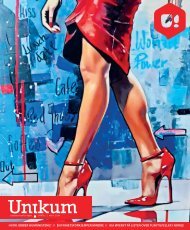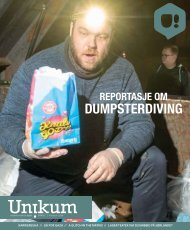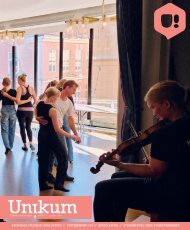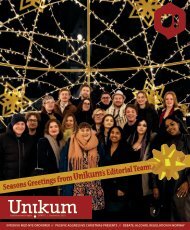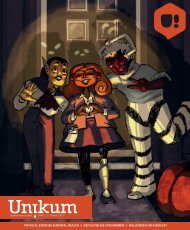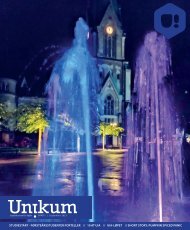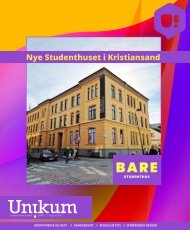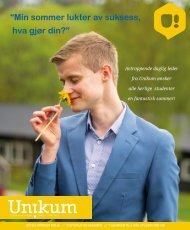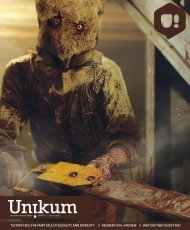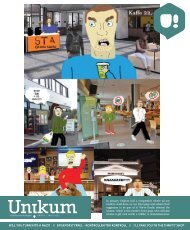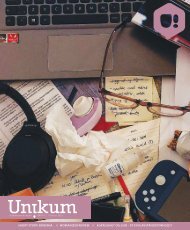Create successful ePaper yourself
Turn your PDF publications into a flip-book with our unique Google optimized e-Paper software.
this workshop on Roma futurism. And we also talked a lot about the
political role of art and about the political discourses that dominate
the arts, or the global movements, like Black Lives Matter and the
memorial statues that were removed during the protests, a sign of
oppressive culture finally being eradicated. In short, it was very
cool and I learned a lot about the individual experiences in their
countries.
In 2022, the first feminist trap Romanian music album entitled
The Techno-Witches was released by Ferentari Studios. This also
made you a threat in another art field, in music. You took the stage
name Kali alongside Niko G (Nicoleta Ghiță), who is also an actress
in Giuvlipen, the theatre company that you co-founded alongside
Zita Moldovan. The lyrics are written by the two of you and the
producers are Wanlov, Andrei Horjea and Iulian Sfircea. What
made you decide to go into music? Was it in the works for a long
time? Did the pandemic made it easier for the two of you to get
together and finish this project?
- Yes, clearly. If the pandemic did not happen, we would not have
gotten the chance to do this because of the time constraints. If we
were having a theatre production, we would make some songs
there, but never with the idea of launching a music album. It was
dope that we had enough time for this and that we got a chance
to explore the musical aspect. I started this because of Nicoleta,
because she is very passionate about trap and has done this for
many, many years. And not only her, also the children from
Ferentari [a neighbourhood from Bucharest]. She is very good
at this anyway. And I wanted her to teach me. And it was dope.
Because somehow, I was getting tired of theatre. You need to take
a break sometimes. And it was the perfect moment, during the
pandemic.
I listened to the album more than a few times. And it doesn’t seem
like you it’s the first time you’ve done this. Your voice fits perfectly
with the melody, with the tone, with everything.
- When it comes down to technique, I progressed a lot. Last year I
was a mess. But in a year, I progressed. I also took canto lessons and
Nicoleta taught me, and I listened to a lot of music. I trained a bit,
but not as much as I would have wished. But for me it was clearly
a debut. And even for Nicoleta who has done this thing for many
years, because she did not make an album previous to this, or any
concerts. Everything was coming from passion, so to say. But never
to do this thing and to be paid for it. In order [for Nicoleta] to not
remain there, in the neighborhood, between their groups.
The music video for Roma Stars was released some weeks ago,
featuring Bianca Mihai. The song starts by saying “I want to be the
first Roma spacewoman, / To travel in space and to the moon, /
To go with the caravan of time to the future, / Come back to sell
progress at Obor fair.” (Obor is the biggest Romanian fair market).
It definitely is the motto of the song and of the album overall. But
is it difficult to sell progress? Are people more reserved or do they
buy it?
- It is a pretty slow process, this thing with selling progress. It is
Foto: Mihaela Drăgan // Amalia Câmpeanu
also a very personal process and an introspective one, by which
I mean that it never ends and that you are never only in the
position of the one who gives progress. I believe it is difficult. But
I think that having these messages in our songs is pretty fun. And
I realised, having my experience from theatre, that it’s easier to
deliver messages through music than through theatre, because
everybody listens to music and the access to music is much easier,
then in theatre. Therefore, this is an instrument that we can use. At
least to me it seemed that the potential is a lot bigger. This was the
discovery while working with this music album.
Recently, you came back with the play entitled Romacen in
Timișoara, Romania. The play marked the beginning of the cultural
movement we talked about. In 2019, you declared that “Roma
Futurism claims the figure of the Roma witch, so stereotyped in
the collective imaginary, and witchcraft becomes our artistic
and political response to the social inequalities and injustices of
the world we live in.” How do you look back on it? Was there a
difference between the public’s response and the feedback you
received from theatre critics or those who work in the arts?
- From 2018 I did all sorts of stuff regarding Roma futurism and
not only the theatre play Romacen, but also a music album and the
short movie The Future Is A Safe Place Hidden In Our Braids. So, I
was preoccupied with developing this movement and it continues
to be an artistic practice that I make use of. I still want to write
maledictions and healing rituals. I am still very passionate about
38






